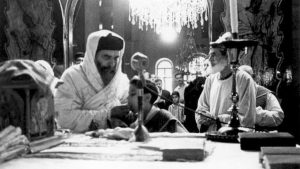Maybe. But I am happy to help them turn off that tap. This stuff is too important.
In Marilyn Chandler McEntyre’s Caring for Words in a Culture of Lies, the author argues that ‘the stewardship of words is akin to stewardship of other resources’ (146). The ecological crisis is not the only crisis which we face. Words are in big trouble. ‘Language can be depleted, polluted, contaminated, eroded, and filled with artificial stimulants’ (1).
Or, switching the analogy a little, we have a problem with ‘junk texts’ that is similar to the one we have with junk food. ‘A steady diet of drivel weakens us’ (82). As with eating well, ‘we (need to) savor and linger over words; we (need to) taste with delight and take in slowly’ (83). If we don’t do so, it will be more of the same where ‘we say more and more about less and less to more and more people’ (230).
As you can imagine, cultural artefacts like news bulletins and talk shows are among those that feel the heat. But the book is not a negative diatribe. Far from it. It is constructive – and this comes through in a couple of ways. One is that McEntyre writes beautifully, adorning her argument with appealing prose. The medium provides a message! Listen to this piece on recovering wit in the face of the contemporary reliance on sarcasm:
Wit doesn’t argue with sophists, simpletons and demagogues. It waves them on their downward path with a quip. They don’t even know they’ve been had. Wit withers with a smile; it never wrangles; it prefers fine-pointed instruments to bludgeons, and uses them to more effect … Wit lands lightly and leaves quickly, never explains a punchline or takes too long to deliver one … Wit awakens the willing and ready and leaves sluggards to their sleep. It doesn’t proselytize or preach, but it does speak truth to power, expose the hypocrite and incites its victims to the distressing self-awareness they may have sought to avoid (207-208).
The second constructive feature is seen in the very backbone of the book itself. The twelve chapters are twelve ‘stewardship strategies’ (‘practices that may help to retrieve, revive and renew our precious language resources’, 10): love words; tell the truth; don’t tolerate lies; read well, stay in conversation; share stories; love the long sentence; practice poetry; attend to translation; play; pray; and cherish silence.
By the way, McEntyre loves Jane Austen (‘whose dual legacy of precision and restraint is a gift to us all’, 48) – but it is another woman about whom she speaks that I’d love to be like: ‘a woman rich in experience who held her own opinions vigorously and was curious about those of others’ (90).
In Kevin DeYoung’s Taking God at His Word, the author claims that ‘the word of God is more than enough to accomplish the work of God in the people of God’ (24). As I replay my past – particularly the years serving the church in New Zealand – I wonder how many people with whom I have walked over the years believe this statement? Some… But it is the ol’ Chesterton quotation which more readily comes to mind. Many consider the word to have ‘been tried and found wanting’ – when the reality is that ‘it has been wanted and not really tried’. That is how I see it.
I’ve enjoyed DeYoung before (here, with a follow-up here). He is chatty and accessible. There is a neat contemporary engagement, while still being anchored in great convictions. Probably more conservative theologically than many readers of this blog – but that is exactly why you should engage him :). Take a risk. Quit the diet of reading only the reassuring echoes of what you already believe!
DeYoung opens with Psalm 119 because it shows us ‘what to believe about the word of God, what to feel about the word of God, and what to do about the word of God’ (16). The rest of the book provides the ‘building blocks’ which enable us to share those Psalm 119 convictions. It is a collection of warmed-over sermons on selected passages in the Bible – 2 Peter 1, Hebrews 1, Deuteronomy 30, Acts 17, 1 Corinthians 2, John 10, and 2 Timothy 3 – from which emerges the useful acronym, SCAN. Sufficiency, Clarity, Authority, and Necessity.
If authority is the liberal problem, clarity the postmodern problem, and necessity the problem for atheists and agnostics, then sufficiency is the attribute most quickly doubted by rank-and-file churchgoing Christians (45).
Amen. The church does need a sharp jolt in its theology of word, beginning with its sufficiency. It is one of the larger blindspots today. I now commence every homiletics/preaching course with this topic. What is the point of going any further, if this is not first in place? Listening to sermons from preachers with a deficient theology of word can be so tedious. They should be considering another vocation methinks. Then, recalling the post which I consider to be the most important one which I have tried to write over the years, DeYoung observes that ‘the Bible is only impractical for the immature, and only irrelevant for the fools who believe that most everything is new under the sun’ (122).
If we learn to read the Bible down (into our hearts), across (the plot line of Scripture), out (to the end of the story), and up (to the glory of God in the face of Christ), we will find that every bit of the Bible is profitable for us (54).
My own high view of Scripture has often been challenged by others along the way. DeYoung addresses three of the leading challenges: (a) starting with what the Bible says about the Bible leads to a circular argument (23-25); (b) being such a bibliolater when I should get my eyes back on the person of Christ (102-110); and (c) affirming all of Scripture to have authority, discarding the populist red-letter approach (117-120).
I like this book – a lot. I’m trying to find a way for it to worm its way into the required reading of my classes – and it is a leading candidate to be the next book I give to each one of my kids. There can be no higher praise.
nice chatting
Paul
About Me

the art of unpacking
After a childhood in India, a theological training in the USA and a pastoral ministry in Southland (New Zealand), I spent twenty years in theological education in New Zealand — first at Laidlaw College and then at Carey Baptist College, where I served as principal. In 2009 I began working with Langham Partnership and since 2013 I have been the Programme Director (Langham Preaching). Through it all I've cherished the experience of the 'gracious hand of God upon me' and I've relished the opportunity to 'unpack', or exegete, all that I encounter in my walk through life with Jesus.
4 Comments
Leave a Comment
Recent Posts
Football helps me train preachers. See, when you speak to me about football—or, ‘footie’—I need to know where your feet are before I can understand what you mean. Are your feet in Ireland, or Brazil, or the USA, or NZ—or in crazy Australia? It must be the most fanatical sporting nation in the world. Within…
Having been born in 1959, I don’t remember much about the 1960s. But I have heard a lot. Hippies. Drugs. Rock ‘n Roll. Assassinations. Moon-walking. A quick trip across to ChatGPT informs me immediately that it was ‘a transformative decade across the world’—marked by the civil rights and feminist movements, Cold War tensions, consumerism and…










This comment has been removed by the author.
About half of my book depository orders come from your blog Paul. 🙂 I'll add these ones, they sound great.
(P.S. Deleted the above comment because of a spelling mistake.)
So you bought the one on the history of cricket in Pakistan, Rhett?
Lol. Have to admit I didn't. Got any books on football?